Have you ever heard a bird speak like a human? If not, you’re in for a treat! Macaw parrots are known for their incredible ability to mimic human speech and sounds. These highly intelligent birds can learn an impressive range of words and phrases with some patience and consistency from their owners.
Unlike humans, the ability to talk is not innate in macaws. However, with proper training, they can develop this skill and enjoy interacting with their owners through talking and other forms of communication. As social creatures, macaw parrots thrive on attention and enjoy forming strong bonds with their owners.
The bond between a talking macaw parrot and its owner is something special. It’s hard to describe the joy that comes from having a conversation with your feathered friend or hearing them repeat something you said earlier. But one thing is for sure: owning a talking macaw parrot is an experience unlike any other.
So if you’re considering getting a pet bird, why not consider a macaw parrot? With their impressive speaking abilities and affectionate personalities, they make wonderful companions that will keep you entertained for hours on end.
Types of Macaw Parrots Known for Talking Abilities
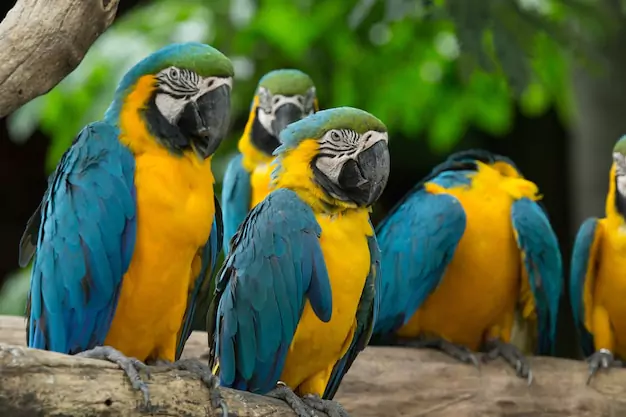
Blue and Gold Macaws: The Most Popular Talking Macaws
Blue and Gold Macaws are one of the most popular types of macaws known for their talking abilities. These birds are highly intelligent, social, and have a great sense of humor. They can develop an extensive vocabulary and mimic human speech with ease. Their loud voices make them stand out among other talking birds. Blue and Gold Macaws love to interact with their owners, so they thrive in households where they receive lots of attention.
If you’re planning to get a Blue and Gold Macaw as a pet, be prepared to spend plenty of time training them. These birds need consistent training sessions to learn new words and phrases. You can start by teaching them simple words like “hello” or “goodbye” before moving on to more complex phrases.
Green-winged Macaws: A Talkative Bird with a Sweet Disposition
Green-winged Macaws have also been known to develop an extensive vocabulary. They are talkative birds that enjoy mimicking sounds around them, including human speech. These macaws are known for their sweet disposition and affectionate nature towards their owners.
Green-winged Macaws require plenty of socialization from a young age to become comfortable around people. If you provide them with enough attention, these birds will reward you by showing off their impressive vocabulary skills.
Scarlet Macaws: Unique Voices That Stand Out Among Other Talking Birds
Scarlet Macaws have a unique voice that makes them stand out among other talking birds. Their loud, clear voices make them excellent at mimicking human speech patterns. These macaws are also highly intelligent and curious birds that enjoy exploring their environment.
Scarlet Macaws require plenty of mental stimulation to prevent boredom from setting in. You can keep your bird entertained by providing it with toys that encourage problem-solving skills or teaching it new words and phrases.
Hyacinth Macaws: Impressive Voices That Mimic Human Speech
Hyacinth Macaws have a deep, resonant voice that is impressive when mimicking human speech. These birds are known for their intelligence and ability to learn quickly. They require plenty of attention from their owners to thrive, but they’re also highly independent birds that enjoy exploring their environment.
If you’re planning to get a Hyacinth Macaw as a pet, be prepared to provide it with lots of mental stimulation. These birds need plenty of toys and activities to keep them engaged and prevent boredom from setting in.
Military Macaws: Lesser-Known But Still Great Talkers
Military Macaws may not be as well-known as other species, but they can still learn to talk with proper training. These birds are highly intelligent and social creatures that enjoy interacting with their owners. They have a unique personality that sets them apart from other macaw species.
Military Macaws require plenty of socialization from a young age to become comfortable around people. You can start by teaching your bird simple words like “hello” or “goodbye” before moving on to more complex phrases.
Blue and Gold Macaw Talking Videos
Watch and Be Amazed
Blue and Gold Macaws are known for their impressive talking abilities, and there are numerous videos online that showcase just how talented these birds can be. From saying funny or unexpected things to singing along to music or making animal noises, these birds never fail to surprise their owners or viewers.
Watching these videos is not only entertaining but can also inspire training your macaw parrot to talk. However, it’s important to remember that every bird is different, so don’t get discouraged if your macaw doesn’t pick up on words as quickly as those in the videos.
The Wonders of Blue and Gold Macaws
Blue and Gold Macaws are one of the most popular pet bird species due to their striking appearance, friendly personalities, and remarkable intelligence. They have a lifespan of up to 60 years in captivity, which means they have plenty of time to learn new tricks – including talking!
These birds have a natural talent for mimicking the sounds they hear around them. They can imitate anything from human speech to other animals’ calls. Some Blue and Golds have been known to mimic entire conversations!
While not all Blue and Golds will become expert talkers, many can learn a few words or phrases with proper training. Consistency is key when teaching your bird new words – repeat the same word or phrase frequently until they start repeating it back to you.
How Do They Learn?
Macaws are intelligent creatures that require mental stimulation to thrive. One way you can provide this stimulation is by teaching them new words. But how do they learn?
Firstly, make sure your bird feels safe and comfortable in its environment before starting any training sessions. Once your bird is relaxed, start by saying a simple word like “hello” while pointing at yourself. Repeat this process several times over several days until your bird starts to associate the word with you.
Once your bird has mastered one word, move on to another. Remember, consistency is key – practice every day and be patient.
Tips for Training Your Macaw
Training your macaw to talk can be a fun and rewarding experience for both you and your bird. Here are some tips to keep in mind:
- Start with simple words or phrases that are easy for your bird to learn.
- Repeat the same word or phrase frequently until your bird starts repeating it back to you.
- Use positive reinforcement techniques like treats or praise when your bird successfully learns a new word.
- Be patient – not all birds will learn at the same pace.
- Keep training sessions short and frequent (around 10 minutes per session).
- Avoid using negative reinforcement techniques like punishment or yelling, as this can cause stress and anxiety in your bird.
Watching Blue and Gold Macaws talking videos is an entertaining way to see just how talented these birds can be. While not all macaws will become expert talkers, many can learn a few words or phrases with proper training. Remember that every bird is different, so don’t get discouraged if yours doesn’t pick up on words as quickly as those in the videos.
With patience, consistency, and positive reinforcement techniques, you can teach your macaw parrot new words and provide it with the mental stimulation that it needs to thrive.
Funny and Entertaining Macaw Parrot Talking Videos
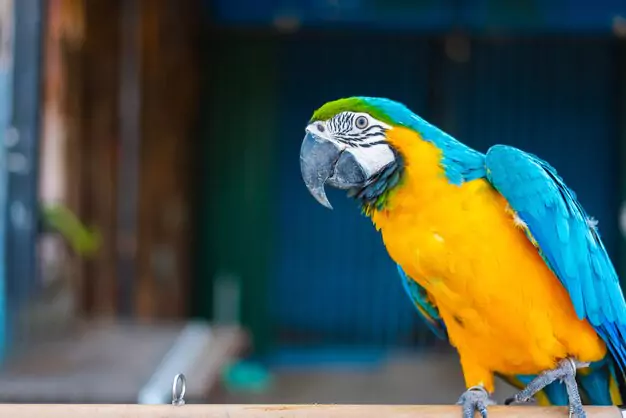
Different Types of Macaws Featured in Entertaining Talking Videos
Blue and Gold macaws are the most popular. However, many other types of macaws have gained popularity on social media platforms such as YouTube and Instagram. Scarlet macaws, Green-winged macaws, Military macaws, and Hyacinth macaws are just some of the other species that showcase their impressive cognitive abilities through talking.
These videos offer a glimpse into the unique personalities of each bird. While some may be more talkative than others, they all seem to have their quirks and mannerisms that make them stand out. Watching these videos can be a great way to learn more about different types of macaws while also being entertained.
Impersonating Celebrities or Cartoon Characters
One of the most entertaining aspects of watching macaw parrots’ talking videos is when they impersonate celebrities or cartoon characters. Some birds have an incredible talent for mimicking voices, which can lead to hilarious results.
For example, there is a video on YouTube where a Blue and Gold macaw named Einstein impersonates Matthew McConaughey’s famous catchphrase “alright alright alright.” Another video shows a Scarlet macaw named Mango singing along to the theme song from The Addams Family TV show.
These types of videos are not only funny but also demonstrate the intelligence and creativity of these birds. It takes a lot of skill to mimic someone else’s voice accurately, especially for extended periods.
Unique Voice or Accent
While some macaws may not be able to impersonate specific voices or phrases, they still have their unique voice or accent that adds to the humor of their speech. For example, some birds may speak with an unusual pitch or tone that makes them sound like they’re trying to imitate humans.
One video features a Green-winged macaw named Rocco who speaks with a British accent. It’s unclear how he learned to speak that way, but it adds an extra layer of humor to his already entertaining videos.
Impressive Cognitive Abilities
Watching macaw parrots talking videos is not only amusing but also showcases the impressive cognitive abilities of these birds. Macaws have been shown to have intelligence levels similar to that of a human toddler, and their ability to learn words and phrases is just one example of this.
These birds can learn hundreds of words and phrases and can even use them in context. They understand the meaning behind certain words and can use them appropriately, which is incredibly impressive.
Not a Benchmark for Your Own Macaw’s Talking Abilities
While watching macaw parrots talking videos can be entertaining, it’s important to remember that they should not be used as a benchmark for your own bird’s talking abilities. Every macaw has its unique personality, intelligence level, and learning style.
Just because a particular bird can speak in full sentences doesn’t mean that yours will be able to do the same. It’s essential to work with your bird at their own pace and understanding while keeping in mind that every bird is different.
Reasons Why Macaw Parrots Can Talk and Mimic Human Speech
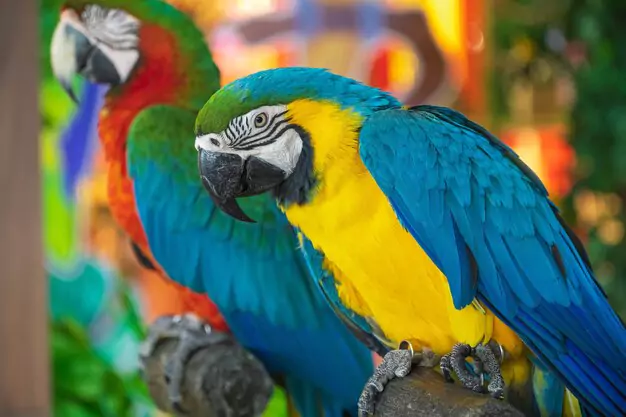
Highly Developed Syrinx
Macaw parrots have a unique syrinx, which is their voice box. This organ allows them to produce complex sounds and mimic human speech. The syrinx of macaws is highly developed, making it possible for them to produce a wide range of sounds that are not found in other bird species. They can manipulate the muscles in their syrinx to create different tones and pitches, producing sounds that are similar to those made by humans.
Excellent Hearing Ability
In addition to having a highly developed syrinx, macaws also have excellent hearing ability. They can pick up on subtle nuances in human language and imitate them with remarkable accuracy. Macaws use vocalizations to communicate with each other in the wild, so mimicking human speech is an extension of this natural behavior.
Social Bonds
Macaws are social animals and establish strong bonds with their flock members through vocalization. In captivity, they bond with their owners through talking as well. Talking is a form of enrichment for captive macaws that provides mental stimulation and helps them bond with their owners.
Parrots enjoy mimicking human speech because it brings them attention from their owners. When you talk to your parrot, they feel like they are part of your conversation or group. It gives them a sense of belongingness that they need as social animals.
Enrichment for Captive Macaws
Talking is also an important form of enrichment for captive macaws because it provides mental stimulation that keeps them happy and healthy. Captive birds often get bored quickly without enough stimulation or interaction from humans or other birds around them.
When you teach your macaw how to talk, it stimulates their mind and keeps them engaged throughout the day. You can teach your pet new words or phrases every day so that they keep learning new things all the time. This keeps them engaged and prevents boredom, which can lead to health problems in captive birds.
Not All Macaws Will Learn to Talk
While some macaws will learn to talk with ease, others may not be able to mimic human speech at all. It depends on the individual bird’s ability and personality. Some macaws are more vocal than others, while some may prefer other forms of communication such as body language or gestures.
It is essential to understand that every bird has its unique personality and abilities. Therefore, it is crucial to respect your pet’s limitations and not force them into doing something they cannot do. Instead, focus on what your bird can do and encourage them in those areas.
How to Train Your Macaw Parrot to Talk
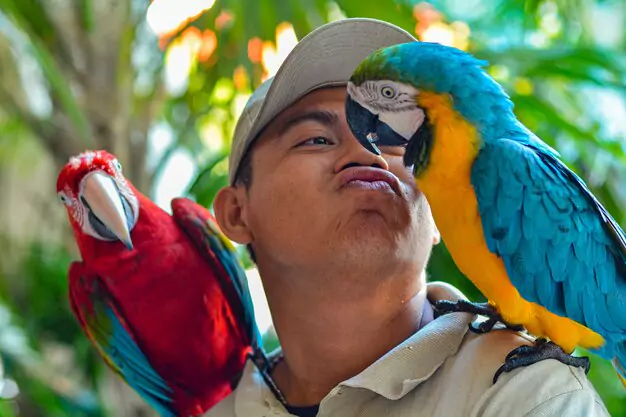
Establishing Trust and Building a Bond
Before you can begin training your macaw parrot to talk, it’s essential to establish trust and build a bond with your bird. Positive reinforcement training techniques are the best way to accomplish this. Start by spending time with your bird every day and offering them treats when they exhibit good behavior. This will help your macaw associate you with positive experiences.
It’s important to create an environment that is conducive to learning. Make sure that your bird has plenty of toys and stimulation, as well as a comfortable place to perch. By creating a safe and stimulating environment for your bird, you’ll be setting them up for success in their language training.
Consistent Use of Short Phrases or Words
Once you’ve established trust and built a bond with your macaw parrot, it’s time to start teaching them how to talk. The first step is to use short phrases or words consistently when interacting with your bird. For example, if you always say “hello” when entering the room where your macaw is located, they will begin associating that sound with your arrival.
It’s also important to use specific words or sounds for certain actions or objects. For instance, if you always say “water” when filling up their water bowl, they will eventually learn what that word means and respond accordingly.
Rewarding Attempts at Mimicking Speech
When training any animal – including birds – consistency is key. This includes rewarding attempts at mimicking human speech. Even if your macaw isn’t quite able to say words yet but makes sounds similar to the ones you’ve been saying around them, reward those efforts.
Positive reinforcement helps encourage good behavior in animals by associating rewards (such as treats) with specific actions or behaviors. By rewarding attempts at talking – even if they’re not perfect – you’re encouraging your macaw to keep trying.
Gradually Increasing Complexity
Once your macaw has mastered simpler words or phrases, it’s time to start gradually increasing the complexity of the words you’re teaching them. This is where patience and consistency come into play. Some birds may take longer than others to start talking, so don’t get discouraged if progress seems slow at first.
Start by introducing new words or phrases one at a time. Repeat them consistently around your bird until they start associating those sounds with specific actions or objects. Once your macaw has learned a few new words, you can start stringing them together into short phrases.
Common Words and Phrases Macaw Parrots Can Learn to Say
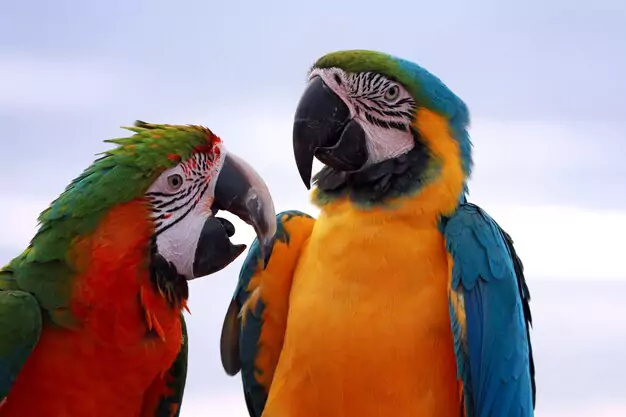
Greetings
Macaws are known for their ability to mimic human speech, and “Hello” and “Hi” are common greetings that many of these birds learn to say. They often use these words to greet their owners or anyone who enters the room. Some macaws may even add a whistle or a chirp at the end of their greeting, making it more unique.
Goodbye
Just like humans, macaws also have routines when leaving the room or house. Owners can teach their feathered friends to say “Goodbye” or “See you later” as part of this routine. This not only makes the bird’s departure more entertaining but also helps establish a sense of structure in their daily lives.
Names
Some birds may pick up on their owner’s name or other family members’ names. It is fascinating when they call out your name from across the room! To teach them names, owners can repeat them frequently while pointing at themselves or others in the family.
Food-related Words
Food is an essential part of a macaw’s life, so it comes as no surprise that food-related words like “treat,” “hungry,” or “dinner” are easily learned by these birds. Owners can use these words when feeding them, helping them associate those sounds with delicious treats!
Popular Phrases
Other popular phrases include “I love you,” “pretty bird,” and “peekaboo.” These phrases are fun and playful and make for great bonding moments between owners and pets. Repetition is key when teaching new phrases to your pet parrot; it takes time and patience.
Tips for Taking Care of Your Talking Macaw Parrot
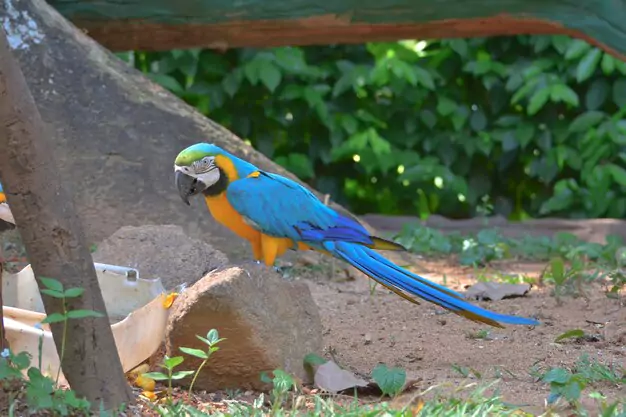
Spacious Cage with Plenty of Toys and Perches
One of the most important things you can do to take care of your talking macaw parrot is to provide it with a spacious cage that has plenty of toys and perches. Macaws are active birds that need a lot of space to move around, play, and exercise. A good rule of thumb is to get a cage that is at least twice the size of your bird’s wingspan.
In addition to providing enough space, make sure your macaw’s cage has plenty of toys and perches for it to play with. This will keep your bird mentally stimulated and prevent boredom, which can lead to destructive behavior like feather plucking or screaming.
Varied Diet with Fresh Fruits, Vegetables, Nuts, and High-Quality Pellets
Another important aspect of taking care of your talking macaw parrot is offering a varied diet that includes fresh fruits, vegetables, nuts, and high-quality pellets. Macaws need a balanced diet that provides them with all the necessary nutrients they need to stay healthy.
Fresh fruits and vegetables should make up the majority of your macaw’s diet. Some good options include apples, bananas, grapes, carrots, broccoli, kale, spinach, and sweet potatoes. You can also offer nuts as a treat or mix them in with your bird’s regular food.
High-quality pellets are another essential part of your macaw’s diet. Look for pellets that are specifically formulated for large parrots like macaws. These pellets should contain all the necessary vitamins and minerals in the right proportions.
Spend Time Interacting with Your Bird Every Day
Macaws are social birds that thrive on interaction with their owners. To keep your talking macaw parrot happy and healthy, make sure you spend time interacting with it every day through talking, playing, or training sessions.
Talking to your macaw is especially important if you want it to learn how to talk back. Macaws are known for their ability to mimic human speech, but they need plenty of practice and repetition to master this skill.
Playing with your macaw can also help keep it mentally stimulated and prevent boredom. Some good toys for macaws include puzzles, ropes, swings, and ladders.
Training sessions are another great way to interact with your macaw and teach it new skills. You can use positive reinforcement techniques like clicker training to teach your bird tricks or behaviors like stepping up onto your hand.
Regular Vet Check-Ups and Preventative Care
Just like any other pet, macaws need regular vet check-ups and preventative care to stay healthy. Make sure you find a vet who specializes in exotic birds and take your macaw for a check-up at least once a year.
During these check-ups, the vet will examine your bird’s overall health, including its weight, feathers, beak, and eyes. They may also recommend additional tests or treatments if they notice any issues.
Preventative care is also important for keeping your talking macaw parrot healthy. This includes things like regular nail trims and wing clips to prevent injury or escape attempts.
Be Aware of Potential Health Issues
Finally, it’s important to be aware of potential health issues that can affect macaws so you can catch them early on. Some common health problems in macaws include feather plucking (a sign of stress or boredom), respiratory infections (which can be caused by poor air quality or exposure to other sick birds), and nutritional deficiencies (which can lead to feather problems or other health issues).
If you notice any signs of illness in your talking macaw parrot such as lethargy, loss of appetite or unusual behavior patterns make sure you contact an avian veterinarian immediately. Early detection is key.
Best Toys and Treats for Your Talking Macaw Parrot
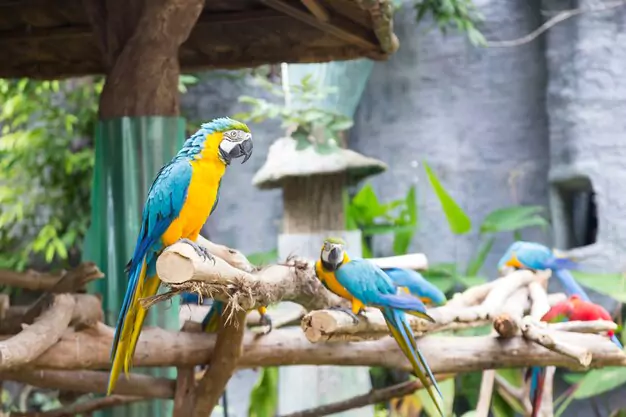
Large Chew Toys for Beak Maintenance and Entertainment
Macaws are known for their strong beaks, which they use to crack nuts and seeds in the wild. In captivity, it’s important to provide your macaw with large chew toys made from natural materials like wood or rope. Not only do these toys provide hours of entertainment, but they also promote healthy beak maintenance by allowing your bird to satisfy its chewing instinct.
Some great options for large chew toys include:
- Wooden blocks: These come in a variety of shapes and sizes and can be strung together on a rope to create a hanging toy.
- Rope perches: These are made from natural fibers like cotton or sisal and can be twisted into different shapes to keep your bird engaged.
- Palm leaf shredders: These are made from dried palm leaves that have been woven together into a ball or cylinder shape. Your macaw will love shredding them apart!
Puzzle Toys for Mental Stimulation
In addition to physical exercise, macaws also need mental stimulation to stay happy and healthy. Puzzle toys that require problem-solving skills are a great way to keep your bird mentally engaged.
Some popular puzzle toys for macaws include:
- Foraging toys: These are designed with hidden compartments where you can hide treats or food pellets. Your macaw will have fun trying to figure out how to get the goodies out!
- Puzzle boxes: These come in various shapes and sizes and usually require your bird to manipulate levers or buttons to access the reward inside.
- Activity centers: These are larger play gyms that feature multiple puzzles, ladders, swings, and other interactive elements.
Nutritious Treats in Moderation
While it’s important not to overdo it on treats, giving your macaw nutritious snacks can be an excellent way to bond with your bird during training sessions. Dried fruits like apricots, cranberries, and mangoes are a great option, as are nuts like almonds, walnuts, and cashews.
It’s important to remember that treats should only make up a small portion of your bird’s diet. Too many high-fat or high-sugar snacks can lead to obesity and other health problems down the line. As a general rule of thumb, treats should make up no more than 10% of your macaw’s daily caloric intake.
Avoid Sugary Treats
While it may be tempting to give your macaw sugary treats like candy or chocolate, these foods can be harmful to their health. Birds have a different digestive system than humans and are not equipped to handle large amounts of sugar or caffeine.
In addition to causing weight gain and other health problems, sugary treats can also disrupt your bird’s sleep patterns and lead to behavioral issues like aggression or anxiety. Stick with nutritious snacks in moderation for the best results.
Mistakes to Avoid When Training Your Macaw Parrot to Talk
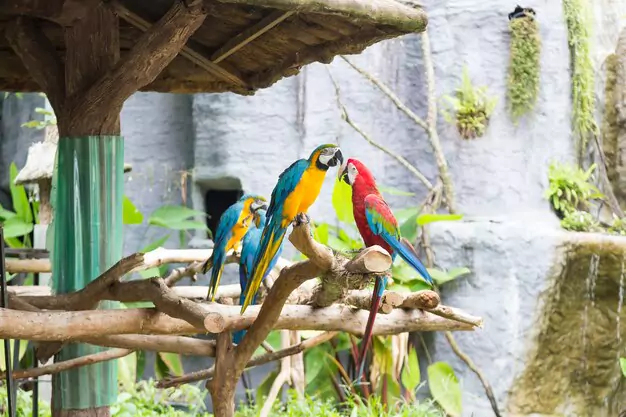
Don’t force your bird to talk if they’re not interested
Macaws are intelligent birds, but they have their personalities and preferences. Some macaws simply prefer not to mimic human speech. If your bird is not showing any interest in talking, don’t force them. Instead, focus on other ways of bonding with your feathered friend, such as playing with toys or training them in other areas.
Avoid using negative reinforcement techniques like punishment when training your bird
Negative reinforcement techniques like punishment can damage the trust between you and your macaw. Instead, use positive reinforcement techniques like treats and praise when they make progress in learning new words or phrases. This will help build a strong bond of trust between you and your bird.
Don’t use too many words or phrases at once when training
It’s important to start small when teaching a macaw to talk. Introducing too many words or phrases at once can be overwhelming for your bird and make it harder for them to learn. Start with simple words like “hello” or “goodbye” and gradually introduce more complex phrases as they become comfortable.
Avoid repeating the same word or phrase over and over again
Repeating the same word or phrase over and over again can cause your bird to become bored or frustrated with the training process. Instead, mix up the words and phrases you teach them each day, so they stay engaged and interested in learning.
Don’t expect immediate results
Teaching a macaw to talk takes time, patience, and consistency. It’s important not to get discouraged if you don’t see immediate results from your training efforts. Keep practicing every day, using positive reinforcement techniques, until your bird starts making progress.
Understanding the Body Language of Your Talking Macaw Parrot
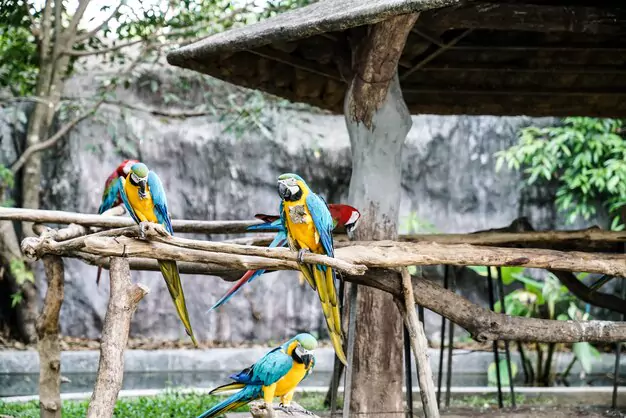
Pay attention to your bird’s body language when interacting with them – this can give you clues about their mood or level of comfort.
Paying attention to their body language is crucial. This will help you understand how they’re feeling and whether they’re comfortable in their environment. Some common signs to look for include fluffed feathers, pinned eyes, relaxed posture, tail fanning, and beak grinding.
Fluffed feathers may indicate that your macaw is feeling cold or sick. If you notice this behavior, make sure to adjust the temperature in the room or take them to a vet if necessary. Pinned eyes could mean they’re feeling threatened or aggressive. In this case, it’s important not to approach them too quickly or invade their personal space.
Fluffed feathers may indicate that your macaw is feeling cold or sick, while pinned eyes could mean they’re feeling threatened or aggressive.
A relaxed posture with wings slightly away from the body indicates that your bird is comfortable and content. They may also close their eyes and appear drowsy when in this state. On the other hand, tail fanning can be a sign of excitement or agitation depending on the context. For example, if you offer them a treat and notice tail fanning along with vocalizations such as squawking or chirping, they’re likely excited.
Beak grinding is a common behavior in macaws that indicates relaxation and contentment. This sound usually occurs when they’re perched on a favorite spot where they feel safe and secure. It’s similar to purring in cats and can be an indication that they trust you.
A relaxed posture with wings slightly away from the body indicates that your bird is comfortable and content.
It’s important to note that every bird has its unique personality traits and preferences regarding how they communicate. Therefore, it’s essential to observe your macaw’s body language and behavior over time to understand their patterns better. This will help you build a stronger bond with them and provide an environment that meets their needs.
The Amazing Ability of Macaw Parrots to Talk and Mimic Human Speech
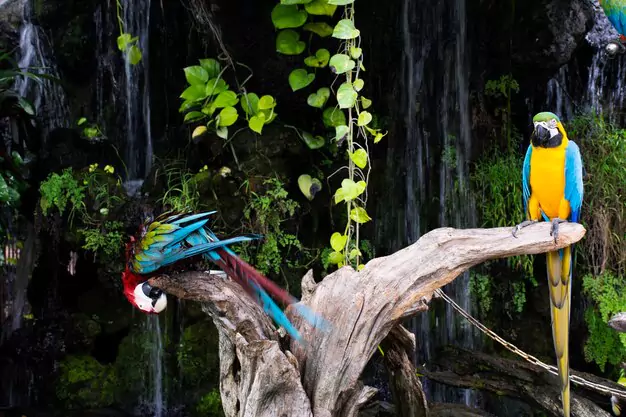
Macaw parrots are known for their incredible ability to talk and mimic human speech. They can learn a wide variety of words and phrases, and some species are more skilled at this than others.
Types of Macaw Parrots Known for Talking Abilities
While all macaws have the potential to learn how to talk, some species are more likely to develop this skill than others. Blue and gold macaws, green-winged macaws, and scarlet macaws are all known for their talking abilities. These birds have a natural talent for mimicking sounds they hear in their environment, including human speech.
Reasons Why Macaw Parrots Can Talk and Mimic Human Speech
Macaw parrots have a unique vocal structure that allows them to imitate sounds they hear around them. They also have a highly developed brain that enables them to process language in much the same way humans do. With proper training and socialization, most macaws can learn how to talk.
How to Train Your Macaw Parrot to Talk
Training your macaw parrot to talk requires patience, consistency, and positive reinforcement. You should start by teaching your bird basic words or phrases using repetition and rewards. As your bird becomes more comfortable with these words, you can gradually introduce new ones.
Common Words and Phrases Macaw Parrots Can Learn to Say
Macaws can learn a wide variety of words and phrases, from simple greetings like “hello” or “goodbye” to more complex sentences like “I love you” or “What’s up?” With consistent training and practice, many macaws can develop an extensive vocabulary.
Tips for Taking Care of Your Talking Macaw Parrot
Taking care of a macaw parrot that can talk requires special attention. You should provide your bird with a healthy diet, plenty of exercise and mental stimulation, and regular socialization to keep them happy and engaged.
Best Toys and Treats for Your Talking Macaw Parrot
Toys and treats can be an excellent way to keep your talking macaw entertained and stimulated. Some popular options include puzzle toys, chew toys, and interactive toys that allow your bird to play with you.
Mistakes to Avoid When Training Your Macaw Parrot to Talk
When training your macaw parrot to talk, it’s important to avoid certain mistakes that can hinder their progress. These include using negative reinforcement or punishment, expecting too much too soon, or failing to provide enough socialization or mental stimulation.
Understanding the Body Language of Your Talking Macaw Parrot
Body language is an essential part of communication for macaws. By understanding their body language cues, you can better communicate with your bird and build a stronger bond. Some common body language signals include fluffed feathers (indicating relaxation), dilated pupils (indicating excitement or fear), and tail wagging (indicating happiness).
FAQs
Can all macaws learn how to talk?
While all macaws have the potential to learn how to talk, some species are more likely than others. Blue and gold macaws, green-winged macaws, and scarlet macaws are all known for their talking abilities.
How long does it take to train a macaw parrot to talk?
The amount of time it takes to train a macaw parrot depends on various factors such as age, personality, environment, etc. It may take several months or even years before your bird develops a significant vocabulary.
What kind of rewards should I use when training my macaw parrot?
Positive reinforcement is key when training any bird, including macaws. You can use treats, praise, or toys as rewards when your bird successfully repeats a word or phrase.
How often should I socialize with my talking macaw parrot?
Macaws are highly social birds and require regular interaction with their owners to stay happy and healthy. You should aim to spend at least a few hours each day interacting with your bird.
What kind of diet is best for my talking macaw parrot?
A healthy diet for a macaw parrot should consist of fresh fruits and vegetables, high-quality pellets, and occasional treats like nuts or seeds. It’s important to avoid giving your bird foods that are high in fat or sugar, as these can lead to health problems over time.








